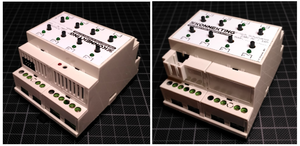DFF4.1
| DFF4.1 | |
|---|---|
| Developer | Alexander Christian |
| Status | Version 1.0 finished |
| Microcontroller/Board | M0dularisM+ |
| KNX connectivity | Siemens BCU, Eugen's µBCU |
Description
The purpose of this actuator is, to control Roto Rototronic skylight with shutters and/or sun blinds. It has 4 "channels". Each channel internally uses two relays: One for the open-action, and one for the close-action.
Of course you can also control your Roto Rototronic skylight with help of a standard switch-actuator. But then you don't have the possibility to "open the window 75%" or "close the shutter 80%". The firmware for DFF4.1 provides all this neat feature that you know from typical shutter/blinds actuators.
Hardware
This actuator consists of the following REG parts:
- M0dularis+
- 8x Button + 8x LED
- 8x Relay Bistable, bus powered (8 relays in total, 2 for each channel = 4 channels).
I2C address on application board:
A0: 1 A1: 0 A2: 0
I2C address on frontend board:
A0: 0 A1: 0 A2: 0
Software
User Documentation
Check here for the DFF4.1 User Manual
Developer Documentation
Firmware sourcecode is on github: https://github.com/KONNEKTING/KonnektingFirmware/tree/master/DFF4.1_1.0 You can't build it yourself, as it depends on KONNEKTING Device Library somewhere between beta4 and beta5 :-(
Get a DIY kit
You're interested in this actuator? Great. This device is available as a DIY kit. What you require:
The kit includes all required parts with re-soldered SMD parts and pre-flashed controller board. You only need:
- Soldering iron and solder
- a screw driver
- a sharp knife with a fine tip
- a working KNX installation where you can connect the device to
- ~2-3hrs to build it according to the build instructions linked on this page
- a computer: Windows, Linux or MAC that is able to run KONNEKTING Suite plus a KNX IP Interface or an KNX IP Router.
- for updating the firmware: A Mini USB cable (Not Micro-USB like on your smartphone. Mini USB is a big thicker as Micro USB)
Please write a mail to info@konnekting.de and refer to this page.
Build It
This actuator uses three PCBs, a bunch of SMD components as well as a lot of mechanical parts. As most users are not able to solder SMD, the PCBs are pre-soldered with all SMD components. Due to the big amount of parts, this actuator comes as a DIY kit: You have to solder non-SMD parts yourself and build up the device and finally flash the firmware with help of a USB connection.
Check here for the DFF4.1 Building Instructions
